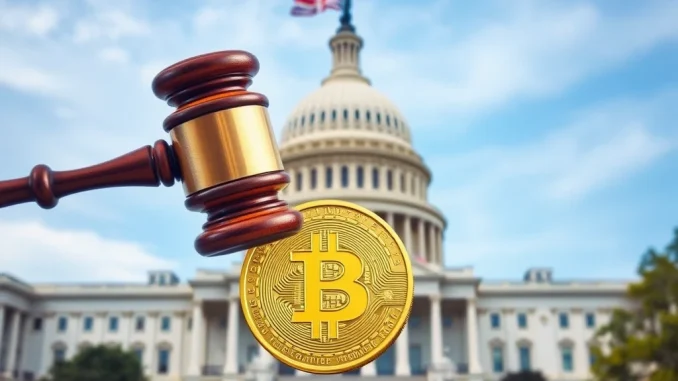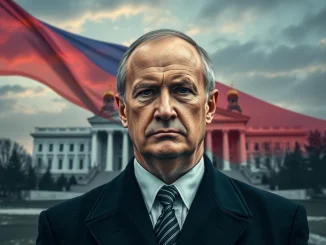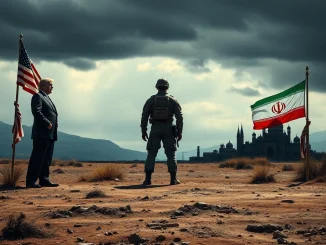
Is the cryptocurrency world about to face another wave of regulatory scrutiny? Recent developments suggest so, particularly with the announcement of World Liberty Financial’s (WLFI) stablecoin, USD1. However, this isn’t just another stablecoin launch; it’s one that’s raising eyebrows in Washington D.C., especially given the firm’s ties to the Trump family. Let’s dive into why five Democratic senators are sounding the alarm and what this could mean for the future of stablecoin regulation.
Why Senators Are Raising Red Flags About USD1 Stablecoin
The core of the issue stems from a perceived conflict of interest. With World Liberty Financial (WLFI) being led by President Donald Trump’s family, concerns are mounting about the potential influence this connection might have on the regulatory landscape. In a letter addressed to key figures at the Federal Reserve and the Office of the Comptroller of the Currency, these senators are seeking clarity on how USD1 will be regulated. This move comes at a time when the independence of financial regulators is already under scrutiny, and Congress is actively debating legislation concerning stablecoins. The senators’ apprehension is palpable, and their questions are valid.
Understanding the Regulatory Oversight Concerns
What exactly are the senators worried about? Their letter highlights several critical points:
- Diminishing Regulatory Independence: There’s a growing unease about political interference in financial regulation. The involvement of a politically connected family in a new financial venture intensifies these concerns.
- Stablecoin Legislation on the Horizon: Congress is currently deliberating on how to regulate stablecoins. The launch of USD1 adds another layer of complexity to this discussion, potentially influencing the direction of future legislation.
- Systemic Financial Risks: Stablecoins, while promising stability, also pose potential risks to the broader financial system if not properly regulated. The senators want to ensure that USD1 is subject to rigorous oversight to mitigate these risks.
In essence, the senators are preemptively questioning whether USD1 will receive the same level of scrutiny as other stablecoin projects, or if political connections might afford it preferential treatment. This is a crucial question, especially for the cryptocurrency industry which is striving for legitimacy and trust.
The Trump Family Connection: A Double-Edged Sword?
The involvement of the Trump family is undoubtedly the elephant in the room. While it could bring significant attention and potentially mainstream adoption to USD1, it also brings along intense political scrutiny. Here’s a breakdown of how this connection might be viewed:
| Potential Benefits | Potential Challenges |
|---|---|
| Increased media attention and public awareness for USD1. | Heightened regulatory scrutiny and skepticism due to political affiliations. |
| Possible access to influential networks and partnerships. | Risk of political backlash and public distrust, especially from those opposed to the Trump administration. |
| Potential for faster adoption among certain segments of the population. | Increased potential for accusations of unfair advantage or preferential treatment from regulators. |
Ultimately, the Trump family name is a powerful brand, but in the highly regulated and politically charged world of finance, it presents a complex set of opportunities and obstacles.
What Role Do Senators Play in Stablecoin Regulation?
Why are these senators so influential in this matter? United States Senators hold significant power in shaping legislation and influencing regulatory bodies. Their concerns are not to be taken lightly. Here’s why their involvement is critical:
- Legislative Power: Senators can introduce and vote on laws that directly impact the regulation of stablecoins and cryptocurrencies. Their current deliberations could lead to new rules and frameworks for the entire industry.
- Oversight Authority: They have the power to oversee and question regulatory agencies like the Federal Reserve and the Office of the Comptroller of the Currency, ensuring they are acting in the public interest and maintaining fair practices.
- Public Opinion Influence: Senators’ statements and actions can significantly shape public opinion and media narratives around cryptocurrencies, influencing investor sentiment and market trends.
The letter from these senators serves as a clear signal that regulatory bodies will be under pressure to thoroughly investigate and oversee USD1. This proactive approach is indicative of a broader trend towards increased regulatory attention on the cryptocurrency space.
Stablecoin USD1: What Does This Mean for the Crypto Market?
The scrutiny surrounding USD1 could have wider implications for the cryptocurrency market, especially for other stablecoin projects. Here’s what to consider:
- Increased Regulatory Focus on Stablecoins: This incident is likely to further intensify the regulatory spotlight on stablecoins globally. Expect more stringent compliance requirements and oversight in the future.
- Impact on Investor Confidence: While some investors might be wary of the political controversy, others may see increased regulation as a sign of maturity and legitimacy for the crypto market, potentially boosting long-term confidence.
- Precedent Setting: How regulators handle USD1 could set a precedent for future stablecoin projects, particularly those with political or high-profile connections.
The launch of USD1 and the subsequent senatorial concerns highlight the delicate balance between innovation and regulation in the cryptocurrency world. It underscores the need for transparency, accountability, and robust regulatory frameworks to ensure the sustainable growth and stability of the digital asset ecosystem.
Conclusion: Navigating the Complexities of Crypto Regulation
The unfolding situation with World Liberty Financial’s USD1 stablecoin is a crucial case study in the ongoing dialogue between cryptocurrency innovation and regulatory oversight. The concerns raised by the senators are not just about one stablecoin; they reflect broader anxieties about political influence, regulatory independence, and the need for a robust framework to govern the burgeoning crypto market. As the industry matures, expect more such instances where political, financial, and technological forces intersect, shaping the future of digital currencies. Staying informed and understanding these complex dynamics will be key for anyone involved or interested in the world of cryptocurrencies.



